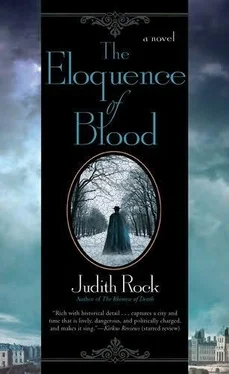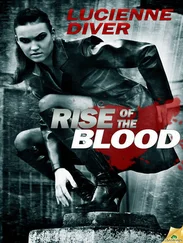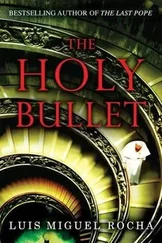Judith Rock - The Eloquence of Blood
Здесь есть возможность читать онлайн «Judith Rock - The Eloquence of Blood» весь текст электронной книги совершенно бесплатно (целиком полную версию без сокращений). В некоторых случаях можно слушать аудио, скачать через торрент в формате fb2 и присутствует краткое содержание. Жанр: Исторический детектив, на английском языке. Описание произведения, (предисловие) а так же отзывы посетителей доступны на портале библиотеки ЛибКат.
- Название:The Eloquence of Blood
- Автор:
- Жанр:
- Год:неизвестен
- ISBN:нет данных
- Рейтинг книги:5 / 5. Голосов: 1
-
Избранное:Добавить в избранное
- Отзывы:
-
Ваша оценка:
- 100
- 1
- 2
- 3
- 4
- 5
The Eloquence of Blood: краткое содержание, описание и аннотация
Предлагаем к чтению аннотацию, описание, краткое содержание или предисловие (зависит от того, что написал сам автор книги «The Eloquence of Blood»). Если вы не нашли необходимую информацию о книге — напишите в комментариях, мы постараемся отыскать её.
The Eloquence of Blood — читать онлайн бесплатно полную книгу (весь текст) целиком
Ниже представлен текст книги, разбитый по страницам. Система сохранения места последней прочитанной страницы, позволяет с удобством читать онлайн бесплатно книгу «The Eloquence of Blood», без необходимости каждый раз заново искать на чём Вы остановились. Поставьте закладку, и сможете в любой момент перейти на страницу, на которой закончили чтение.
Интервал:
Закладка:
Seeing that the line of boys was still long, he went back to thinking about his dreams. The nun had been the least disturbing of his phantoms. Perhaps Marin’s talk of the Sacred Heart had summoned her, Soeur Marguerite Marie, the Visitandine who had revived the old Sacred Heart devotion after her vision of resting her head on Jesus’ heart. It was Pernelle’s visitation that had disturbed him, and profoundly. His famished sinking onto the bed, onto her body, his cheek on her warm naked breast…
“No!” he said desperately, loudly, shaking his head. The last boys in the line jumped and looked wide-eyed at him, and he managed a reassuring smile and waved them through the gate. Then he raised his lantern and signaled to the brothers at the ends of the lane that all the boys were safely inside the college. The brothers signaled back and went to report to the officers at the front doors, as Pere Le Picart’s plan for the morning demanded.
Charles was shutting the gate when the sound of quick footsteps at the end of the lane made him open it again and go out to see who was there. A woman, just visible in the slowly lightening morning, was passing the lane’s end, walking toward the rue St. Jacques. By her shape, she was the same woman he’d seen yesterday morning. But this time he realized that what he recognized about her were the heavy braids coiled around her head. She was one of Reine’s companions, one of the beggars in the stable the night he’d fed them. He called to a lay brother to lock the gate and ran down the lane, hoping that the woman could tell him where to find Reine.
When he reached the end of the lane, the woman wasn’t in sight. Charles started down toward the rue St. Jacques, thinking he’d see her going in one direction or the other. But as he passed the old building that had belonged to the college of Les Cholets and was now part of Louis le Grand and undergoing renovation, the light of the lantern he still carried fell on the snow drifted and piled against the wall. Charles stopped, gazing at the little slope of snow. From the top of the old wall stones had fallen, and under the well-trampled snow they made a rough ramp to the top of the wall. Charles wondered if the woman in the lane had disappeared so quickly because she had gone over the wall. Looking, perhaps, for leavings from the workmen to steal and sell? Cautiously, Charles mounted the frozen slope and held up his lantern to light the court of the old building. The courtyard was empty, but its carpet of snow was full of crossing footprints. Not workmen’s prints, because he knew that no work had been done on the building since Christmas Eve.
Charles jumped down into the court and followed the prints to the low, iron-bound door. The wood around the door’s old lock was broken and the lock useless. Warily, holding his lantern high, he pushed the door open. When he was sure that the anteroom beyond was empty, he went in and promptly stumbled over a workman’s bucket. The anteroom was cluttered with debris from the repair work, and a line of planks leaned against a wall. A strong draft was blowing from behind the planks. Curious, Charles shifted two of them where the current of air was strongest, put out a hand to feel the wall behind, and felt only emptiness. He let his lantern shine into the emptiness. Worn stone stairs opened at his feet. Caves, he thought. Cellars. Like Louis le Grand, Les Cholets would have cellars beneath it, cellars probably much older than the buildings themselves. Pere Damiot had once told him that the city was honeycombed with caves built before anyone’s memory, many of them connected, some leading all the way to the river. Rat squeaking echoed up the stairs, and Charles backed away. If the woman he’d seen was down in that rat-infested place, she could stay there. There were other ways to find Reine.
He was replacing the plank he’d moved when someone screamed in the cave, a harsh, guttural scream that shaded into the high pitch of terror and stopped abruptly. Dear God, Charles thought, the woman from the lane! He flung the plank to the floor, grabbed the lantern, and started down the stairs, telling himself how stupid he was being. He was alone, he was unarmed, he knew nothing at all about the cause of the scream. Except that it came from a human throat. Someone down in that ancient darkness was terrified of more than rats, terrified beyond reason, maybe beyond hope. With every step, he expected the scream to come again. It didn’t, but when he reached the bottom of the stairs, he heard voices-distant, arguing, he thought, though he couldn’t hear the words. The sounds whispered off the stone of the walls and ceiling, making him unsure which way to go. But if he went any way at all, how would he find his way back? He moved the lantern slowly, close to the floor, until he saw a loose fragment of stone. Marks on the wall would show him the way back-if the lantern’s candle lasted that long.
Straining to make out words, he went slowly and quietly, giving himself at least those small protections. Only a fool would burst in on an argument after hearing a scream like the one still echoing in his head. Time seemed to melt into the darkness. Charles turned a corner. Now he could hear words. And he recognized one of the voices.
“You killed her,” Marin was shouting. “My blessed Claire! You murdered all her sweetness and took her sacred heart, God damn you to the lowest hell!”
“No, I didn’t. I didn’t mean to. Not her! And it was for you, don’t you-”
Marin howled with rage, the other voice cried out in pain, and then there was silence.
Charles froze, listening. Nothing. Only the rats. And then a sound that wasn’t rats threaded its way toward him, a steady calm sound. He crept forward a few steps. A high, sweet voice was singing very softly. Charles felt his way around another corner and saw a faint glow, like fire. With the glow came the song’s words.
“Little white Paternoster, sent by God from paradise… now I lie down-”
Coughing stopped the voice, and the angle of another corner cut off the glow. At nearly the same moment, the candle flame in Charles’s lantern guttered and died, leaving him in darkness thick as Paris mud. The darkness seemed to pull at him and hold him back. A desire not to see, not to know who or what was singing beside the hidden fire, assailed him. The voice began again, crooning the garbled, ancient prayer every peasant knew, less prayer than magic.
“Now I lie down on my bed, an angel at the foot, two angels at the head…”
Charles forced himself forward and the cellar opened out. Beyond a fire built on the stone floor, the singer leaned over someone resting in his lap. Charles’s breath caught in his throat, and he put a hand on the cave wall to steady himself. Marin was sprawled across the singer’s lap-the singer was Jean, his keeper. Blood streamed from the old man’s chest and ran across the floor into the fire. Smiling, carefully turning aside the long-bladed knife he held, Jean gathered Marin more closely to him and began singing again. Charles felt the hair rise on his scalp.
“The Virgin Mary sweetly says, lie down now, do not be afraid. The good God is my father, the good Virgin is my mother, the three apostles are my brothers.”
A whimper began from the deep shadows veiling the cave walls and was abruptly hushed. There were other people there, Charles realized, motionless against the stone. Jean went on singing.
“The Virgin Mary walked in the meadows, Madame the Virgin met Saint John. Where is God, she begged to know. On the cross tree, I tell you so, His feet hang down, His hands are nailed, a little white thorn cap on his head. Who says this prayer, both morn and night, shall surely go to Paradise.”
Jean fell silent, stroking Marin’s shaggy hair. A shuddering sob from one of the women huddled against the wall made Jean look up, and he saw Charles.
Читать дальшеИнтервал:
Закладка:
Похожие книги на «The Eloquence of Blood»
Представляем Вашему вниманию похожие книги на «The Eloquence of Blood» списком для выбора. Мы отобрали схожую по названию и смыслу литературу в надежде предоставить читателям больше вариантов отыскать новые, интересные, ещё непрочитанные произведения.
Обсуждение, отзывы о книге «The Eloquence of Blood» и просто собственные мнения читателей. Оставьте ваши комментарии, напишите, что Вы думаете о произведении, его смысле или главных героях. Укажите что конкретно понравилось, а что нет, и почему Вы так считаете.












